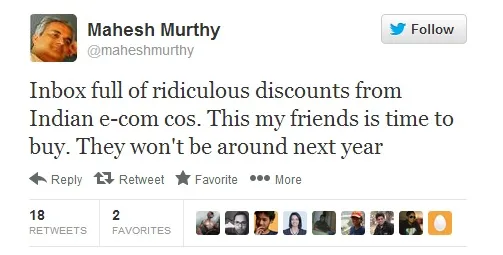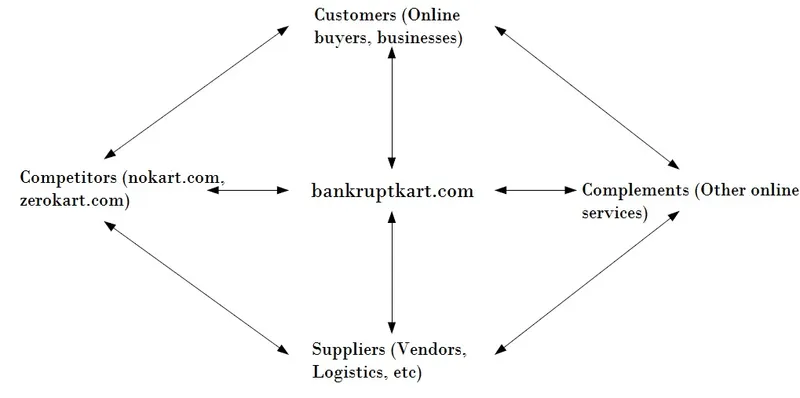Can Game Theory help Indian eCommerce companies escape the ridiculous price-wars?
We’ve seen enough and it’s time to settle some scores. Yes, eCommerce is lucrative (not was), it’s not going to die down and we need more players who can satisfy the demand. People will come online but let’s not acquire them for the moment, only to lose them in the longer run. We'll be dissecting one of the key problem plaguing the eCommerce industry currently- Price Wars. And what better then game theory to help us along the way. What is game theory?
As Wikipedia says, Game Theory is a study of strategic decision making. Playing literally by it, Price Wars is the only natural solution and going by hard coded logic- the one with the deepest pockets will win. But we'll look at some rosier aspects that can be used to turn the game in your favour.
Competition
This beast called ‘competition’ never ceases to surprise; it is something so innate to a business that there’s obviously no running away from it. Talking about eCommerce, this area is seeing some fierce competition in India. There are approximately 140 million internet users in India and 25 million of them have made online transactions off which around 10 million are regular online buyers (BBC reported) and this goes on to show the potential the space possesses.
And trying to grab this pie, are the several thousand hundred players. There are more than 650 eCommerce companies that we know of and we’re sure there are more. They all want to change the buying habits of customers and bring them online (but there is a lot of inertia because of some reasons). Now, all this competition isn’t bad. Let’s hear out the legendary Seth Godin on the topic, “Competition validates you. It creates a category. It permits the sale to be this or that, not yes or no. And this or that is a much easier sale to make.” Also, “There are seven billion people in the world. Even if your market is hand-made spoke shaves for left-handed woodworkers, there are more people in your market than you can ever hope to track down.” Now, that settles competition but how do you differentiate yourself.
Game Theory
The Indian eCommerce industry is heading the Chinese way where companies are embroiled into fierce deadly price wars. No one is going to make money by just trumping each others discounts. As Mahesh Murthy, Managing Partner at Seedfund succinctly put it in a tweet recently:

In game theory terms, it is a complete lose-lose game and anyone now entering the space would be foolhardy. The ones with deep (deep) pockets will have a chance to survive.
Having made that clear, if you’re an eCommerce company with not very deep pockets, what should you do? Change the game! How? We’ll come to that but before we do, let’s draw the value net for an eCommerce company.

Along the vertical dimension are the company’s customers and suppliers. Resources such as labor and raw materials flow from the suppliers to the company, and products and services flow from the company to its customers. Money flows in the reverse direction, from customers to the company and from the company to its suppliers. Along the horizontal dimension are the players with whom the company interacts but does not transact.
And we need to understand what changing the game means. We’ll take the most famous example of GM- The time was early 1990’s and the car manufacturers were in a similar price war, an example of destructive competition (detailed HBR paper). In September 1992, General Motors and Household Bank issued a new credit card that allowed cardholders to apply 5% of their charges toward buying or leasing a new GM car, up to $500 per year, with a maximum of $3,500. The GM card has been the most successful credit-card launch in history. One month after it was introduced, there were 1.2 million accounts. Two years later, there were 8.7 million accounts—and the program is still growing. They changed the game. (another example in this post by Talvinder Singh)
We focus a lot of competition which is important but complements are equally important and they’ll help you change the game. Taking a very direct example, complements are people who sell socks if you’re selling shoes and both don’t have intentions of cross expansion.
eCommerce companies need to take advantage of the human vanity. One of the impressive attempts that I came across recently is Bakebox (see how they’re doing it without entering price wars). Alok Kejriwal, in a post illustrated how eCommerce needs brains, not price wars. People are ready to pay, the only thing you need to do is titillate them enough. A person online is vulnerable and is only a swipe away from making the purchase. Something as simple as letting the customer embroider text or a picture on a shirt or customizing a product to her liking will do you a lot of good rather than giving a 50% discount on that shirt. Discounts are a very temporary measure- Change the game, or atleast tweak it. Another interesting examples are TeaXpress and KashmirBox. (disclaimer: all opinions regarding companies belong to the author)
But once you’ve done that, your competitor follows the same marketing ploy. What do you do? Well, it’s not a zero sum game. And copying is the best form of flattery. Your competitor copying you is a good thing because it expands the market and shifts the focus from price wars. It’s a win-win and you’re ahead in the curve. Competition need not necessarily be destructive. And to stay ahead, you need to find your niche, and we don't mean a segment, we mean an area. If you're known for supreme customer support, that will give you loyal customers, if you're known for quick delivery, that'll get you another set. But make sure you doing atleast one thing really well about which your customers can talk. It finally boils down to being innovative and keep re-inventing yourself, but that is how the game is. If you're not ready for it, don't burn your fingers.
Join us for eSparks 2013 on February 16th in Bangalore to learn all that is happening in the Indian eCommerce space.







